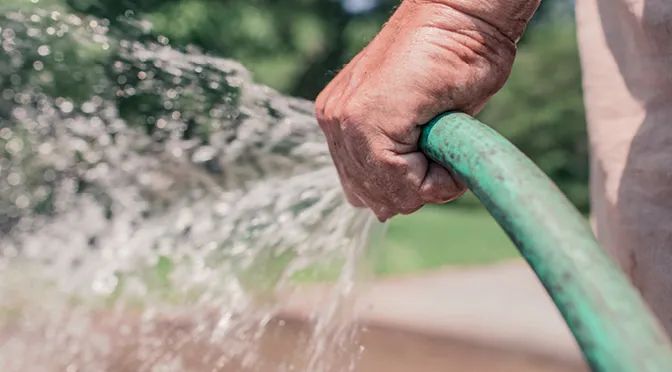
Water conservation tips for the dry summer months
In the midst of this hot and dry season, it can often feel like a full-time job keeping the lawn and garden watered. While it’s helpful to invest in a sophisticated, automated irrigation system, this isn’t the only answer to conserving water during these dry summer months. We’ve put together some low-cost tips that will help you save time and money while keeping your yard happy and green.Timing
Timing is everything when it comes to irrigation. This encompasses time of day, duration of time that water is applied to each area, and how many times a week you’re turning on the sprinklers or irrigation system.
When it comes to the time of day, watering your yard in the early morning is the prime time for optimal results. Early mornings provide low air temperatures and wind speeds, preventing extra evaporation and allowing your yard to soak up more of those precious droplets.
How often, and how long, you water also plays a crucial role in conservation. Exact recommendations vary depending on the amount of sun or shade your yard receives, as well as the type of sprinkler or irrigation system you're using. A good rule of thumb is to water your yard two or three times per week. Keep an eye on the weather and water less if rain is expected. You may even want to delay watering a day or two if there is a chance for rain so that the ground isn’t saturated just before a downpour.
It’s best to divide your yard into watering zones and determine the magical amount of watering time that works for each zone. Remember – all zones are not created equal! You won’t need to water shaded zones as long as the spots that receive intense sun all day. Use your cell phone or even an oven timer to set an alarm so that you don’t waste precious resources over-watering an area, which causes runoff.
Lawn Treatment
The way you maintain your lawn, gardens, and flowerbeds has an impact on their ability to absorb and utilize water. Some small investments can create a healthier yard that needs less water. Be sure to mulch all of your beds, including any raised garden beds. Not only does mulching reduce weeds, but it also provides a sunblock for your plants’ roots, retaining soil moisture and preventing evaporation. For your lawn, try aerating the grass. By digging small holes throughout your lawn, water is better able to reach the grass’s roots.
Another maintenance tip is to mow your lawn less frequently. That’s right – a free pass to take it a little easier in the name of water conservation! The longer grass blades yield shade that keeps applied water from evaporating as rapidly. You can also raise your mower blades 25-50% to avoid cutting the grass too short. We recommend sharpening those mower blades once a month during the summer to prevent dull blades that tear at the grass, requiring more water to help your lawn recover.
Recycle & Reduce
If you’d like to put the rain that we do receive to good use, it’s worth setting up a catchment system to retain water that can be utilized at a later date. This can be a more sophisticated system that harvests rain from your roof's runoff and stores it in a large tank or a more straightforward method of a trashcan attached to the gutter with a connected hose. You can even stick some buckets outside before an expected rain and dip from these to water hanging or potted plants. Recycle dirty water from kid’s pools or water tables by pouring it into flowerbeds instead of dumping it on the concrete.
Take your water conservation efforts indoors by taking less frequent, shorter showers. Mounting research is showing that many Americans shower more often than is necessary, depleting natural oils and immune-system supporting bacteria. Try spacing out your shower sessions a little further, and maybe even skip a shampoo here and there to cut down on time spent per shower.
Consistency
Be consistent in your watering efforts. You want to maintain slightly moist soil at all times, versus a yo-yo approach of extremely wet followed by bone-dry soil. Set calendar reminders on your phone if you struggle to remember to water until the grass is brown or the plants are dead. Find a groove and system that works for your yard and stick to it. Above all, try to enjoy your time in the yard and the beauty and growth that healthy watering yields… because winter is coming!
about the author...Anna Rogers is a transplant from the Carolinas with a background in marketing and graphic communications. She is a wife and mother who loves to garden, cook, and practice yoga. Anna is passionate about travel, which at its core is really a passion for people, as she believes people and community are what truly bring life and beauty into a place.
